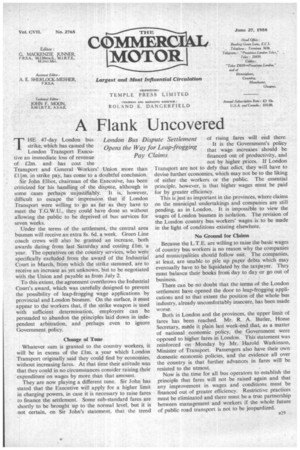A Flank Uncovered
Page 39

If you've noticed an error in this article please click here to report it so we can fix it.
THE 47-day London bus strike, which has caused the London Transport Executive an immediate loss of revenue of £2m. and has cost the Transport and General Workers' Union more than film. in strike pay, has come to a doubtful conclusion.
Sir John Elliot, chairman of the Executive, has been criticized for his handling of the dispute, although in some cases perhaps unjustifiably. It is, however, difficult to escape the impression that if London Transport were willing to go as far is they have to meet the T.G.W.U., they could have done so without allowing the public to be deprived of bus services for seven weeks.
Under the terms of the settlement, the central area busmen will receive an extra 8s. 6d. a week. Green Line coach crews will also be granted an increase, both awards dating from last Saturday and costing elm. a year. The operatives on the country services, who were specifically excluded from the award of the Industrial Court in March, from which the strike stemmed, are to receive an increase as yet unknown, but to be negotiated with the Union and payable as from July 2.
To this extent, the agreement overthrows the Industrial Court's award, which was carefully designed to prevent the possibility of leap-frogging wage applications by provincial and London busmen. On the surface, it must appear to the workers that, if the strike weapon is used with sufficient determination, employers can be persuaded to abandon the principles laid down in independent arbitration, and perhaps even to ignore Government policy.
Change of Tune Whatever sum is granted to the country workers, it will be in excess of the flm. a year which London Transport originally said they could find by economies, without increasing fares. At that time their attitude was that they could in no circumstances consider raising their expenditure on wages by more than that amount.
They are now playing a different tune. Sir John has stated that the Executive will apply for a higher limit in charging powers, in case it is necessary to raise fares to finance the settlement. Some sub-standard fares are shortly to be brought up to the normal level, but it is not certain, on Sir John's statement, that the trend of rising fares will end there. It is the Government's policy that wage increases• should be financed out of productivity, and not by higher prices. If London Transport are not to defy that edict, they will have to devise further economies, which may not be to the liking of either the workers or the public. The essential principle, however, is that higher wages must be paid for by greater efficiency.
This is just as important in the provinces, where claims on the municipal undertakings and companies are still pending, as in London. It is impossible to view the wages of London busmen in isolation. The revision of the London country bus workers' wages is to be made in the light of conditions existing elsewhere.
No Ground for Claims Because the L.T.E. are willing to raise the basic wages of country bus workers is no reason why the companies and municipalities should follow suit. The companies, at least, are unable to pile up paper debts which may eventually have to be liquidated by the taxpayer. They must balance their books from day to day or go out of business. • There can be no doubt that the terms of the London settlement have opened the door to leap-frogging applications and to that extent the position of the whole bus industry, already uncomfortably insecure, has been made worse.
Both in London and the provinces, the upper limit of fares has been reached. Mr. R. A. Butler, Home Secretary, mgde it plain last week-end that, as a matter of national economic, policy, the Government were opposed to higher fares in London. This statement was reinforced on Monday by Mr. Harold Watkinson, Minister of Transport. Passengers also have their own domestic economic policies, and the evidence all over the country is that further advances in fares will be resisted to the utmost.
Now is the time for all bus operators to establish the principle that fares will not be raised again and that any improvement in wages and conditions must be financed out of greater efficiency. Restrictive practices must be eliminated and there must be a true partnership between management and workers if the whole future of public road transport is not to be jeopardized.








































































































































